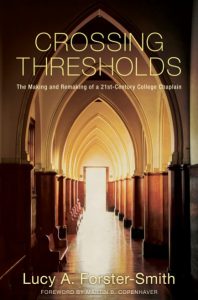 Crossing Thresholds: The Making and Remaking of a 21st-Century College Chaplain
Crossing Thresholds: The Making and Remaking of a 21st-Century College Chaplain
by Lucy A. Forster-Smith
Wipf & Stock, August 2015, 160 pp.
In this excerpt from Crossing Thresholds, Lucy Forster-Smith discusses the challenges and privileges inherent in her role as college chaplain. Her writing gives us a window into the spiritual life of a modern college campus. Lucy currently serves as the chaplain at Harvard University, but in the excerpt below she shares about her work at Macalester College.
As a college chaplain, I am called to attend to the emotional and spiritual life of the community. I am asked to notice the edges, the overlaps, the contradictions within the campus community. And I know I am certainly one of the best suited of the college personnel to do so. Because being a college chaplain at this time in history is nothing if not full of contradictions. I often feel out of place as a religious person in the secular academy. Often I wonder if the words I speak in public prayers or private conversations make any sense to a generation of post-modern young adults. I know what it is to have feet of clay as I lumber through my days.
For some, my presence as a chaplain on campus may come as a great relief. For others, it may raise a concern.
Even in moments when my role should be clear, it can be riddled with ambiguity. How do new students make sense of the fact that their official college experience—the fall convocation—begins with a chaplain-led prayer at a college which was presented to them as an academically rigorous, secular institution? How do they reconcile my presence with Macalester’s pride in its distinction as one of the top-ranked colleges in a national survey for “ignoring God on a regular basis”? For some, my presence and prayer may come as a great relief. For others, it may raise a concern.
What occurs on that stage, at that podium, is but one of many remarkably juicy juxtapositions that occur here, as at colleges everywhere. Students are asked to tackle the big questions of life’s meaning and purpose, as they’re simultaneously urged to take up a course of study that will lead to a productive and successful life. The young woman whose mother is undergoing chemo treatments and the young man recently diagnosed with bipolar disorder must also balance these life-jarring experiences with the expectations of faculty and institution to produce and perform with excellence. And jarring too: the debilitating homesickness that so surprises the student who deliberately chose to move as far as possible from the family he is already starting to miss.
Contradictions are critical to mobilizing action and, I would argue, to mobilizing faith.
Liberal arts educators take pride in plunging students into conflicting views with no absolutes. Students spend hours trying to make sense of material that may be obsolete a decade after they graduate. As their parents pay for tuition by refinancing the house, draining bank accounts or amassing mortgage-sized loans, young adults know they are being launched into an economy where meaningful work is scant and that a good education is no longer a sure route to stability and prosperity. College challenges them to expend hours serving others with an ideal of changing the world but the institution sometimes has a harder time recognizing and honoring students’ inner life of fear, worry, joyful wonder, and longing for love. But what liberal arts education has always known is that contradictions are critical to mobilizing action and, I would argue, to mobilizing faith. This generation faces daunting challenges as the globe warms and conflict among nations chills us, population explodes and the gulf widens between those who have and those who don’t as religious intolerance is on the rise and questions of the meaning and purpose of life itself awaken the need for ancient traditions to speak a fresh word to our world. Those of us who are in the role of educators realize our work is urgent. And, even on their first day as college students, these young people likely know it as well.
…
It is into my hands that my institution has entrusted the care of young souls.
My work is not all contradiction. There are clear expectations laid out by the institution. I am there to care for students, to pray for and with them—likewise for the faculty and the staff. For the young adults who have no way of guessing, as they sit at this convocation, that many of them will have a rough road ahead, I am there to assure them and their parents that I am a resource for support, guidance or advice. It is into my hands that my institution has entrusted the care of young souls.
I am also there to shepherd a religiously diverse campus community. My work requires me to be highly literate in the range of traditions and practices in our midst and, simultaneously, to honor those who are firmly secular.
I am also there to call the community to prayer and reflection. When we mourn a beloved faculty member, or watch in helpless horror as a catastrophe replays over and over on the news, or, like now, are simply ushering in a new year at an opening ceremony, my role is to remind us that we live in times of deep anxiety and magnificent splendor. This is the closest most college chaplains come to being a priest, to standing in the midst of the community. Finding the words or holding the silence in those moments is my very humble contribution to helping this college navigate this highly charged and complex moment in history.
Used with permission from Wipf and Stock Publishers, www.wipfandstock.com.
Like this post? Subscribe to have new posts sent to you by email the same day they are posted.



Leave a Reply